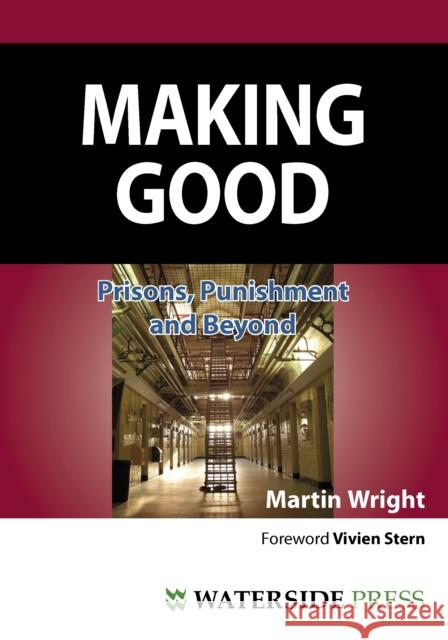Making Good: Prisons, Punishment and Beyond » książka
Making Good: Prisons, Punishment and Beyond
ISBN-13: 9781904380412 / Angielski / Miękka / 2008 / 320 str.
Second edition with additional material by the author, and a new foreword by one of the UK's leading penal reformers. Classic and original - one of the works that paved the way for the development of the Restorative Justice movement. Argues that the real need is for fundamental rethinking of crime and punishment, rather than short-term tinkering with a prison system that is in an intolerable state of crisis. Demonstrates that neither the conservative idea of deterrence through punishment nor the liberal ideal of rehabilitation has worked in practice and proposes the basis for a radical but carefully worked out practical philosophy which would place the emphasis on the offender making amends to the victim and society for the damage caused. 'All those concerned with the monstrosity that is our current prison system, the unchecked growth of the criminal justice system as the response to social problems and the poverty of ideas in dealing with the harm caused by crime will find a re-read of this classic text very worthwhile': Baroness Vivien Stern (from the Foreword). 'The real value of this book is surely in the philosophical arguments that he puts forward to support his thinking. He forces the reader to think through what society's expectations are when someone is sent to prison. Is it to deter against future offending or to deter others? To isolate the criminal from society for the protection of the public? Or is it for rehabilitation? The aims of imprisonment are expounded at length later in the book together with an appraisal of the ethical and practical aspects of punishment, deterrence, denunciation and of justice itself. Making Good provides a demanding, but fascinating read. Although the description of prison life a quarter of a century ago and the thinking behind the policies that determined it, belong to the era in which it was written, the arguments Martin Wright puts forward about justice and punishment still remain pertinent today: ' Internet Law Book Reviews. 'Engages with some diverse elements of imprisonment and with contemporary penal issues': Helen Poole, Coventry University. Martin Wright is a former Director of the Howard League for Penal Reform, Policy Officer of Victim Support, and Librarian of the Cambridge Institute of Criminology. He is a Senior Research Fellow, Faculty of Health and Life Sciences, De Montfort University, Leicester, and the author of Restoring Respect for Justice and Justice for Victims and Offenders. He is joint editor of Mediation and Criminal Justice: Victims, Offenders and Community. A founder member of the Restorative Justice Consortium, he is currently a member of its board, and acts as a voluntary mediator in the Lambeth Mediation Service, London. As an active member of the European Forum for Restorative Justice he has spoken at many international conferences, and is an Honorary Fellow of the Institute for Conflict Resolution, Bulgaria.
Second edition with additional material by the author, and a new foreword by one of the UKs leading penal reformers. Classic and original - one of the works that paved the way for the development of the Restorative Justice movement. Argues that the real need is for fundamental rethinking of crime and punishment, rather than short-term tinkering with a prison system that is in an intolerable state of crisis. Demonstrates that neither the conservative idea of deterrence through punishment nor the liberal ideal of rehabilitation has worked in practice and proposes the basis for a radical but carefully worked out practical philosophy which would place the emphasis on the offender making amends to the victim and society for the damage caused.All those concerned with the monstrosity that is our current prison system, the unchecked growth of the criminal justice system as the response to social problems and the poverty of ideas in dealing with the harm caused by crime will find a re-read of this classic text very worthwhile: Baroness Vivien Stern (from the Foreword).The real value of this book is surely in the philosophical arguments that he puts forward to support his thinking. He forces the reader to think through what societys expectations are when someone is sent to prison. Is it to deter against future offending or to deter others? To isolate the criminal from society for the protection of the public? Or is it for rehabilitation? The aims of imprisonment are expounded at length later in the book together with an appraisal of the ethical and practical aspects of punishment, deterrence, denunciation and of justice itself. Making Good provides a demanding, but fascinating read. Although the description of prison life a quarter of a century ago and the thinking behind the policies that determined it, belong to the era in which it was written, the arguments Martin Wright puts forward about justice and punishment still remain pertinent today: Internet Law Book Reviews.Engages with some diverse elements of imprisonment and with contemporary penal issues: Helen Poole, Coventry University.Martin Wright is a former Director of the Howard League for Penal Reform, Policy Officer of Victim Support, and Librarian of the Cambridge Institute of Criminology. He is a Senior Research Fellow, Faculty of Health and Life Sciences, De Montfort University, Leicester, and the author of Restoring Respect for Justice and Justice for Victims and Offenders. He is joint editor of Mediation and Criminal Justice: Victims, Offenders and Community. A founder member of the Restorative Justice Consortium, he is currently a member of its board, and acts as a voluntary mediator in the Lambeth Mediation Service, London. As an active member of the European Forum for Restorative Justice he has spoken at many international conferences, and is an Honorary Fellow of the Institute for Conflict Resolution, Bulgaria.











